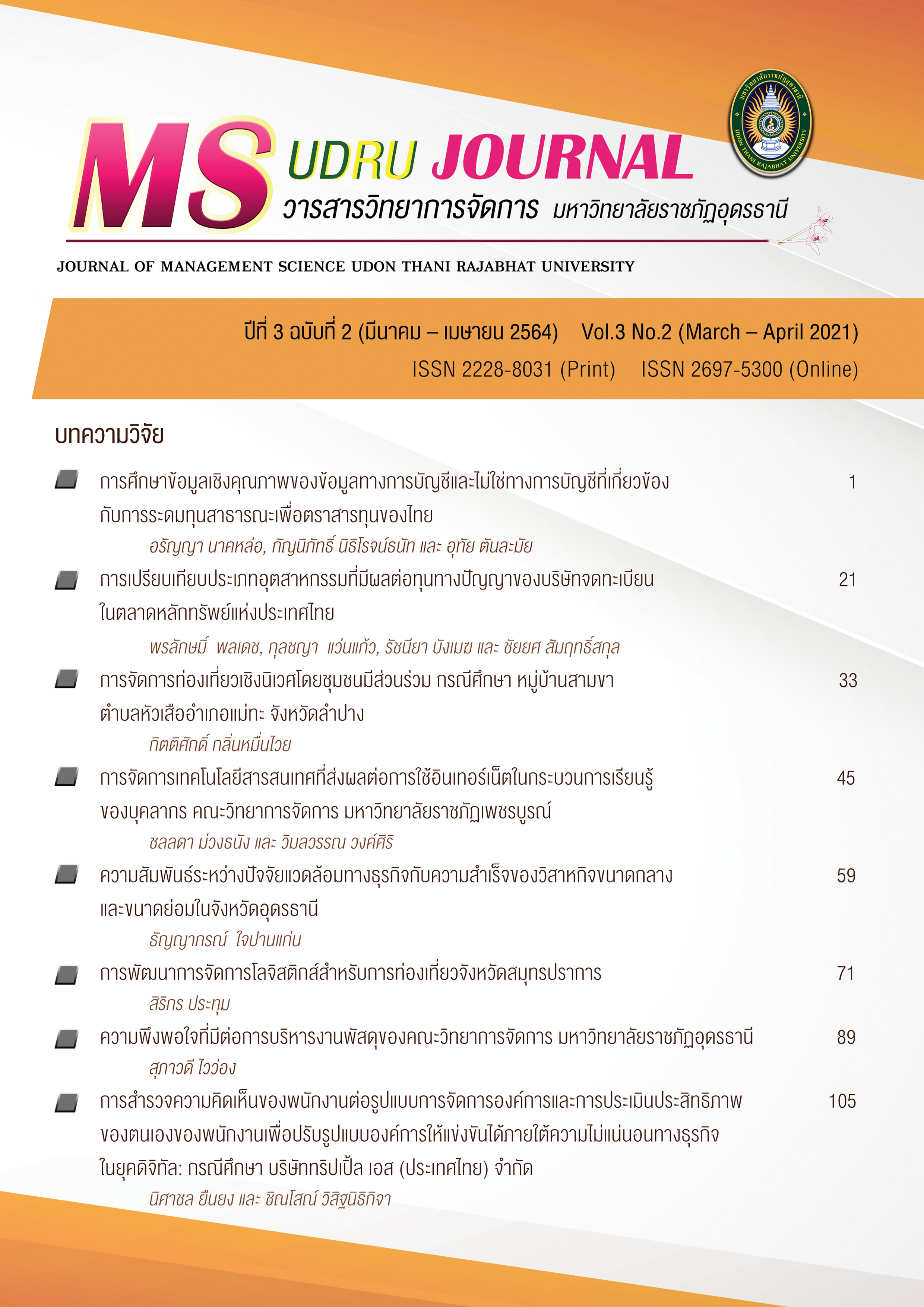การศึกษาข้อมูลเชิงคุณภาพของข้อมูลทางการบัญชีและไม่ใช่ทางการบัญชีที่เกี่ยวข้องกับการระดมทุนสาธารณะเพื่อตราสารทุนของไทย
Main Article Content
บทคัดย่อ
การระดมทุนสาธารณะเพื่อตราสารทุนหรือการระดมทุนแบบคราวด์ฟันดิงเป็นแหล่งทุนรูปแบบใหม่สำหรับสตาร์ทอัพและธุรกิจขนาดกลางและขนาดย่อมของไทย อย่างไรก็ตามในรอบ 3 ปีที่ผ่านมา ประเทศไทยมีการระดมทุนในลักษณะนี้สำเร็จเพียงบริษัทเดียวเท่านั้น ในขณะที่ในประเทศต่างๆ ประสบความสำเร็จในการระดมทุนสาธารณะเพื่อตราสารทุนเป็นอย่างมาก งานวิจัยนี้มุ่งศึกษาการใช้ข้อมูลทางการบัญชีและไม่ใช่ทางการบัญชีในบริบทของประเทศไทย ในมุมมองของผู้มีส่วนเกี่ยวข้องจำนวน 4 กลุ่ม โดยเก็บข้อมูลจากการสัมภาษณ์เชิงลึกผู้มีส่วนร่วมในการระดมทุน จำนวน 23 คน ซึ่งประกอบด้วย นักลงทุน 15 คน ผู้บริหารของบริษัทผู้แสวงหาเงินทุน 4 คน ผู้ให้บริการแพลตฟอร์มคราวด์ฟันดิง 3 คน และผู้แทนหน่วยกำกับดูแลระบบคราวด์ฟันดิง 1 คน ผลการวิจัยพบว่าผู้เข้าร่วมการวิจัยส่วนใหญ่ให้ความสำคัญกับข้อมูลทางการบัญชีในเรื่องของผลตอบแทนทางการเงินที่คาดหวัง ประมาณการทางการเงิน งบการเงิน และอัตราส่วนทางการเงิน โดยข้อมูลที่ไม่ใช่ทางการบัญชีที่เกี่ยวเนื่องกับบริษัทผู้แสวงหาเงินทุนประกอบด้วย ทีมบริหารและพนักงาน ศักยภาพทางการตลาด ลักษณะผลิตภัณฑ์หรือบริการ รูปแบบธุรกิจ การสื่อสาร จำนวนเงินระดมทุน และเครือข่ายของบริษัทผู้แสวงหาเงินทุน ผลการวิจัยนี้จะเป็นประโยชน์กับผู้ให้บริการแพลตฟอร์มและผู้แทนหน่วยกำกับดูแลระบบคราวด์ฟันดิง ในการให้ความสำคัญต่อแนวคิดความไม่เท่าเทียมกันของข้อมูลระหว่างบริษัทผู้แสวงหาเงินทุนและนักลงทุน ทั้งนี้งานวิจัยนี้ได้พัฒนากรอบแนวคิดสำหรับการวิจัยในอนาคต เพื่อศึกษาว่าผู้มีส่วนเกี่ยวข้องในการระดมทุนสาธารณะเพื่อตราสารทุนจะนำข้อมูลทางการบัญชีและไม่ใช่ทางการบัญชีไปใช้อย่างไร โดยมีการเชื่อมโยงมุมมองทางด้านการเงินเชิงพฤติกรรมกับประเด็นดังกล่าว
Article Details

อนุญาตภายใต้เงื่อนไข Creative Commons Attribution-NonCommercial-NoDerivatives 4.0 International License.
บทความที่ได้รับการตีพิมพ์เป็นลิขสิทธิ์ของคณะวิทยาการจัดการ มหาวิทยาลัยราชภัฏอุดรธานี
ข้อความที่ปรากฏในบทความแต่ละเรื่องในวารสารวิชาการเล่มนี้
ไม่ใช่ความคิดเห็นและความรับผิดชอบของผู้จัดทำ บรรณาธิการ กองบรรณาธิการ และคณะวิทยาการจัดการ มหาวิทยาลัยราชภัฏอุดรธานี ความรับผิดชอบด้านเนื้อหาและการตรวจร่างบทความแต่ละเรื่องเป็นความคิดเห็นของผู้เขียนบทความแต่ละท่าน
เอกสารอ้างอิง
Ahlers, G. K. C., Cumming, D., Günther, C., & Schweizer, D. (2015). Signaling in Equity Crowdfunding. Entrepreneurship Theory and Practice, 39(4), 955-980.
Akerlof, G. (1970). The market for lemons. Quarterly Journal of Economics, 84(3), 488-500.
Angerer, M., Brem, A., Kraus, S., & Peter, A. (2017). Start-up funding via equity crowdfunding in Germany–a qualitative analysis of success factors. The Journal of Entrepreneurial Finance, 19(1), 1.
Bikas, E., Jurevičiené, D., Dubinskas, P., & Novickyté, L. (2013). Behavioural finance: The emergence and development trends. Procedia Social and Behavioral Sciences, 82, 870-876.
Brown, R., Mawson, S., Rowe, A., & Mason, C. (2018). Working the crowd: Improvisational entrepreneurship and equity crowdfunding in nascent entrepreneurial ventures. International Small Business Journal, 36(2), 169-193.
Bruns, W. J. (1968). Accounting information and decision-making: some behavioral hypotheses. The Accounting Review, 43(3), 469-480.
Courtney, C., Dutta, S., & Li, Y. (2017). Resolving information asymmetry: Signaling, endorsement, and crowdfunding success. Entrepreneurship Theory and Practice, 41(2), 265-290.
Cumming, D., & Johan, S. (2013). Demand-driven securities regulation: evidence from crowdfunding. Venture Capital, 15(4), 361-379.
Cumming, D., Meoli, M., & Vismara, S. (2019). Investors’ choices between cash and voting rights: Evidence from dual-class equity crowdfunding. Research Policy, 48(8), 103740.
Estrin, S., Gozman, D., & Khavul, S. (2018). The evolution and adoption of equity crowdfunding: entrepreneur and investor entry into a new market. Small Business Economics, 51(2), 425-439.
Forbes, H., & Schaefer, D. (2017). Guidelines for Successful Crowdfunding. Procedia CIRP, 60, 398-403.
Gabison, G. A. (2015). Equity crowdfunding: All regulated but not equal. DePaul Bus. & Comm. LJ, 13(3), 359.
Glaser, B. G., & Strauss, A. L. (1967). The discovery of grounded theory: strategies for qualitative theory. New York: Traylor & Francis Group.
Graham, J. R., Harvey, C. R., & Huang, H. (2009). Investor competence, trading frequency, and home bias. Management Science, 55(7), 1094-1106.
Hirshleifer, D., & Hong Teoh, S. (2003). Herd behaviour and cascading in capital markets: A review and synthesis. European Financial Management, 9(1), 25-66.
Hornuf, L., & Schmitt, M. (2016). Success and failure in equity crowdfunding. CESifo DICE Report, 14(2), 16-22.
Hossain, M., & Oparaocha, G. O. (2017). Crowdfunding: Motives, Definitions, Typology and Ethical Challenges. Entrepreneurship Research Journal, 7(2), 20150045.
Kirsch, D., Goldfarb, B., & Gera, A. (2009). Form or substance: the role of business plans in venture capital decision making. Strategic Management Journal, 30(5), 487-515.
Koch, J.-A., & Cheng, Q. (2016). The Role of Qualitative Success Factors in the Analysis of Crowdfunding Success: Evidence from Kickstarter. In Proceedings of the 20th Pacific Asia Conference on Information Systems (PACIS 2016), Taiwan: Chiayi.
Kuppuswamy, V., & Bayus, B. L. (2015). Crowdfunding creative ideas: The dynamics of project backers in Kickstarter. In Proceedings of the 20th Pacific Asia Conference on Information Systems (PACIS 2016), Taiwan: Chiayi.
Kvale, S., & Brinkmann, S. (2009). InterViews : learning the craft of qualitative research interviewing. California: SAGE.
Li, X., Tang, Y., Yang, N., Ren, R., Zheng, H., & Zhou, H. (2016). The value of information disclosure and lead investor in equity-based crowdfunding: An exploratory empirical study. Nankai Business Review International, 7(3), 301-321.
Löher, J. (2017). The interaction of equity crowdfunding platforms and ventures: an analysis of the preselection process. Venture Capital, 19, 51-74.
Lukkarinen, A., Teich, J. E., Wallenius, H., & Wallenius, J. (2016). Success drivers of online equity crowdfunding campaigns. Decision Support Systems, 87, 26-38.
Mamonov, S., & Malaga, R. (2018). Success factors in Title III equity crowdfunding in the United States. Electronic Commerce Research and Applications, 27, 65-73.
Marom, D., Robb, A., & Sade, O. (2016). Gender dynamics in crowdfunding (Kickstarter): Evidence on entrepreneurs, investors, deals and taste-based discrimination. Retrieved January 15, 2020, from https://papers.ssrn.com/sol3/papers.cfm?abstract_id=2442954
Mollick, E. (2014). The dynamics of crowdfunding: An exploratory study. Journal of Business Venturing, 29(1), 1-16.
Moritz, A., Block, J., & Lutz, E. (2015). Investor communication in equity-based crowdfunding: a qualitative-empirical study. Qualitative Research in Financial Markets, 7(3), 309-342.
Paakkarinen, P. (2016). Success factors in reward based and equity based crowdfunding in Finland. Master of Science in Information and Service Management, Department of Information and Service Economy, School of Business. Aalto University.
Pompian, M. M., (2011). Behavioral finance and wealth management: how to build investment strategies that account for investor biases. New Jersey: John Wiley & Sons, Inc.
Rechtman, Y., & O'Callaghan, S. (2014). Understanding the basics of crowdfunding. The CPA Journal, 84(11), 30.
Robertson, E., & Wooster, R. B. (2015). Crowdfunding as a social movement: The determinants of success in Kickstarter campaigns. Retrieved January 15, 2020, from https://papers.ssrn.com/sol3/papers.cfm?abstract_id=2631320
Signori, A., & Vismara, S. (2018). Does success bring success? The post-offering lives of equity-crowdfunded firms. Journal of Corporate Finance, 50, 575-591.
Tomboc, G. F. B. (2013). The lemons problem in crowdfunding. The John Marshall Journal of Information Technology & Privacy Law, 30:2, 253.
Tran, T., Dontham, M. R., Chung, J., & Lee, K. (2016). How to succeed in crowdfunding: a long-term study in kickstarter. Retrieved January 15, 2020, from https://www.researchgate.net/publication/305637974_How_to_Succeed_in_Crowdfunding_a_Long-Term_Study_in_Kickstarter
Valanciene, L., & Jegeleviciute, S. (2013). Valuation of crowdfunding: benefits and drawbacks. Economics and Management, 18(1), 39-48.
Vulkan, N., Åstebro, T., & Sierra, M. F. (2016). Equity crowdfunding: A new phenomena. Journal of Business Venturing Insights, 5, 37-49.
Walthoff-Borm, X., Schwienbacher, A., & Vanacker, T. (2018). Equity crowdfunding: First resort or last resort? Journal of Business Venturing, 33(4), 513-533.
Wright, M., & Robbie, K. (1996). Venture capitalists, unquoted equity investment appraisal and the role of accounting information. Accounting and Business research, 26(2), 153-168.


